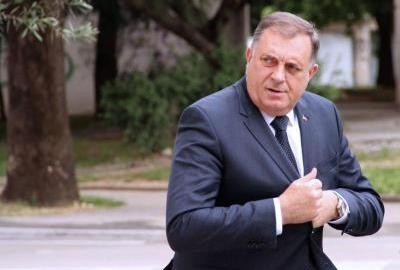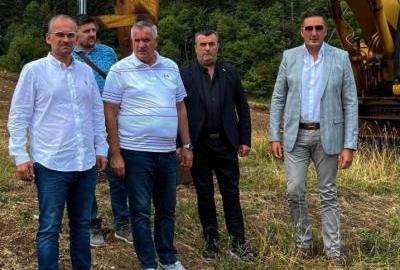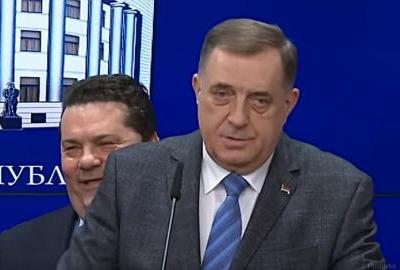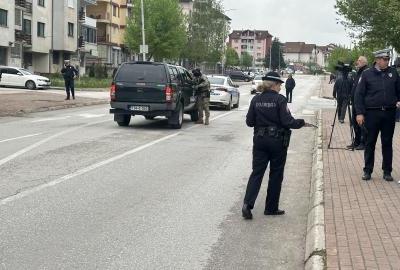Žurnal in English
DEFENSE STRATEGY OF MILORAD DODIK: Citizens as a Human Shield in the Protection of the President and Family
An apparent challenge for Dodik and those around him is the lack of support among the people in Republika Srpska, unlike what they had, for example, in 2006 when Dodik rose to political heights, replacing the rhetoric of a moderate social democrat with a radical nationalist narrative. Since then, Dodik's policies have not brought anything good to the citizens of Republika Srpska.

Milorad Dodik is currently facing one of the most challenging situations in his multi-decade political career. He is undergoing a trial at the Court of Bosnia and Herzegovina after the state prosecutor accused him of the criminal offence of "Failure to Implement Decisions of the High Representative." This has prompted him to open a front against Western countries, especially the United States and the United Kingdom, which have imposed sanctions on him. His latest significant blow came after his son and daughter, Igor and Gorica, found themselves on the U.S. "blacklist" due to involvement in corruption.
Nothing happened overnight. Due to his radical rhetoric, calls for secession, and political actions carried out by the authorities in Republika Srpska (RS) under his command, as well as close ties with Russia, Dodik has long been at odds with Western countries. Nevertheless, in the past, to some extent, he managed to assert himself as a political force without which Bosnia and Herzegovina could not function. However, Dodik's room for manoeuvre, where he could play "hot and cold," ignite small political fires in Bosnia and Herzegovina and then extinguish them, has significantly diminished due to global events and the escalating conflict between the West and Russia, in which he is a promoter and executor of Moscow's orders. The goal is to keep Bosnia and Herzegovina in a constant political crisis.
RAISING A PARTY ARMY
Dodik's main and only goal is to preserve himself from a possible prison sentence after the conclusion of the trial at the Court of Bosnia and Herzegovina. This would, in line with the amendments to the Criminal Code imposed by the High Representative in BiH, Christian Schmidt, also mean the end of his political career. Therefore, in recent days and weeks, Dodik has mobilised his entire party army and well-paid propaganda machinery in an effort to defend himself.
The defence of Dodik's character and actions has several directions. Firstly, there is an attempt to equate him with the entire Republika Srpska, thereby trying to rally the entire entity against Western countries. This aims to homogenise the population in Republika Srpska so that, if necessary, he can expose it as a human shield for personal defence. Dodik's problem is that this homogenization is not proceeding as he expects, as evidenced by the weak response to gatherings organised by his Alliance of Independent Social Democrats (SNSD) throughout the entity under the slogans "The Border Exists" and rallies of "Defending Srpska."
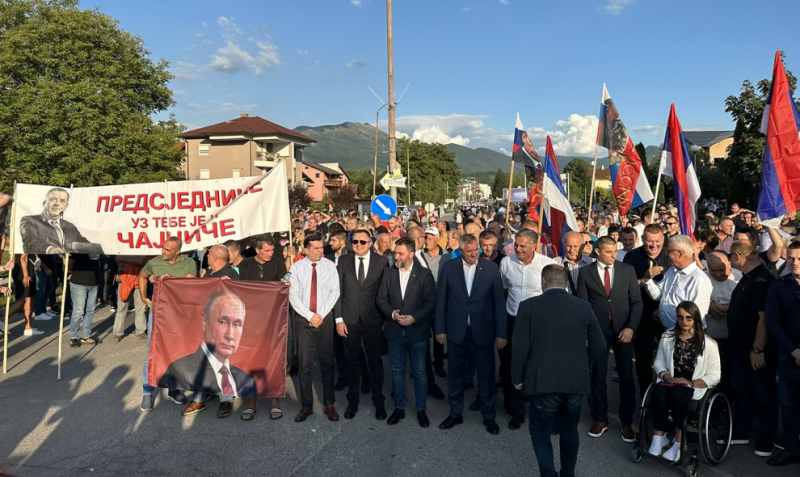
At the rally in Trebinje, claimed to be the largest to date, around one and a half thousand people gathered. Gatherings on the administrative inter-entity line mostly attract a few hundred party activists and people from the public sector (often coerced to attend). The biggest fiasco was the petition signing event in support of Dodik and his family in Pale under the slogan "We are also Milorad Dodik's family." Only around thirty SNSD members, led by the Minister of Foreign Trade and Economic Relations of BiH, Staša Košarac, attended. The banner they carried could be considered credible since there is no dispute that they belong to the same "family," given media reports linking attendees from the Pale event to corrupt and unlawful actions. Staša Košarac's ex-wife openly accused him of domestic violence in testimony before the House of Representatives of BiH. Dodik's second defence strategy relies on constant threats of secession and provoking incidents.
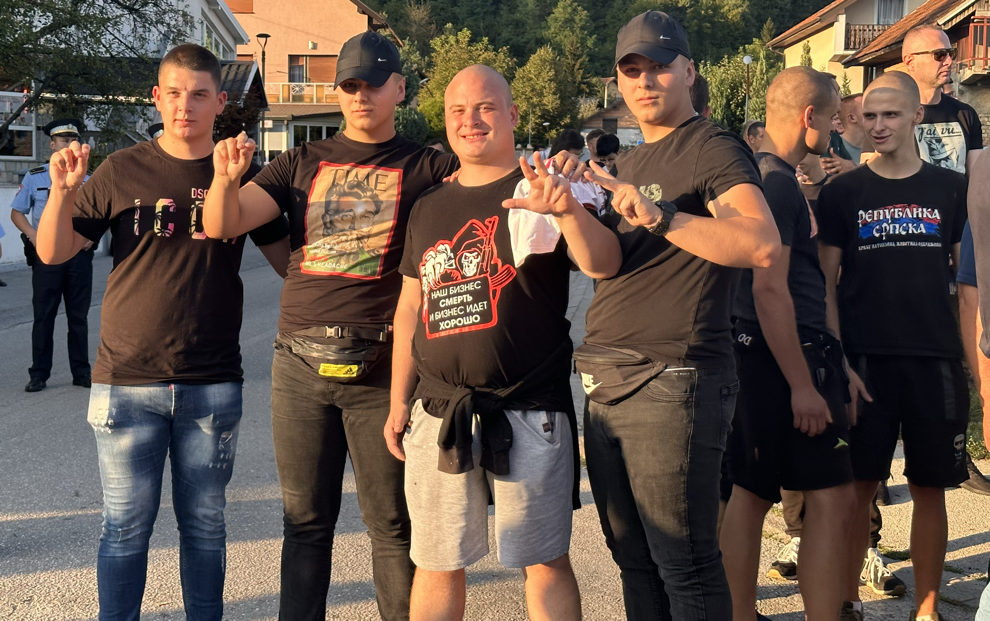
According to his projection, these could eventually lead to the disappearance of the state of Bosnia and Herzegovina. The goal of such announcements is to spread fear of a new inter-ethnic conflict in Bosnia and Herzegovina, with threats of possible RS independence primarily directed towards politicians in Sarajevo and international representatives of Western countries. This is done to exert pressure on the judiciary to ensure that the legal process against him concludes in his favour. Dodik is attempting to secure a favourable verdict for himself, even if it means provoking incidents and endangering the entire Republika Srpska and its inhabitants.
DODIK'S SUPPORTERS ADDITIONAL THREATS
Dodik's apologists are increasing the intensity day by day, issuing threats of possible incidents if Dodik is found guilty before the Court of Bosnia and Herzegovina. RS Prime Minister Radovan Višković openly announced that the legal process against Dodik "can provoke unwanted reactions," emphasising that it is the constitutional obligation of the RS Ministry of Internal Affairs to protect the president of the republic.
"Imagine the absurdity if someone issues an arrest warrant for the president. Does there have to be contact between institutions and the RS Ministry of Internal Affairs, and who will be responsible for that?" Višković said.
He stated that there could be an "escalation of the security situation in Bosnia and Herzegovina" at some point.
"I wanted to tell them this, and let them know that they must consider this. It would be good for them to think about it in time," Višković said, mentioning that he informed the Head of the EU Delegation to BiH, Johann Sattler, about this.
A day later, Bosnia and Herzegovina's Ambassador to Serbia, Aleksandar Vranješ, characterised the placement of Igor and Gorica Dodik on the U.S. "blacklist" as an "attack" on Dodik's family. He stated that it demonstrated how "the collective West is far willing to go in its unscrupulous political battle." Vranješ labelled the legal proceedings against Dodik and the imposition of U.S. sanctions on Igor and Gorica Dodik as a strong desire of the High Representative and supporting countries to "discipline Serbs at any cost, destroy the RS, and overthrow Milorad Dodik." He then issued a clear threat that "such policies pave the way for a completely opposite scenario."
"While Schmidt nails the last nails in the coffin of the state community with Western applause, Serbs manifest their determination to defend Republika Srpska, its symbols, property, and institutions. Serbs are forging defensive plans, so it's no wonder that the head of the political department of the British Embassy in Sarajevo, Helen Fluker, was intrigued regionally, investigating how much support Dodik has in Republika Srpska and beyond. A lot of things interest political Helen. From how Milorad Dodik stands in the motherland to whether our police will defend him with all means if Anglo-judges in Sarajevo pass judgement on him. None of the answers pleased her. She will leave Bosnia and Herzegovina confused one day. Just like Schmidt," assessed Vranješ.
Before his diplomatic career and advisory position in Dodik's cabinet, Aleksandar Vranješ publicly acted as an analyst, advocating close ties with Russia and opposing NATO integration in Bosnia and Herzegovina. He earned the title of associate professor at the Faculty of Political Science in Banja Luka, despite media accusations, accompanied by arguments, that he plagiarised his master's thesis on "Yugoslav war film on the topic of the People's Liberation Struggle as a means of political propaganda" in 2008.
ALL THE LESS SUPPORT
The apparent problem for Dodik and those around him is that they no longer have the support of the people in Republika Srpska (RS), as they did in 2006 when Dodik rose to political prominence, replacing the rhetoric of a moderate social democrat with a radical nationalist narrative. Since then, Dodik's policies have not brought anything good to the citizens of RS. On the contrary, institutions have further deteriorated, fundamental pillars of society from education to healthcare are completely devastated, and crime and corruption are thriving. The standard of living for the majority of people is declining, leading hundreds of thousands to leave RS in search of a better life. It's important to understand that many have left RS not only for higher salaries and a better standard of living but also due to the atmosphere of constant tension and insecurity, largely generated by Milorad Dodik and the establishment in Republika Srpska. Ultimately, people in RS have experienced high representatives dismissing entity presidents and political officials, and nothing spectacular happened. Many remember that Milorad Dodik strongly supported such measures
(zurnal.info)





